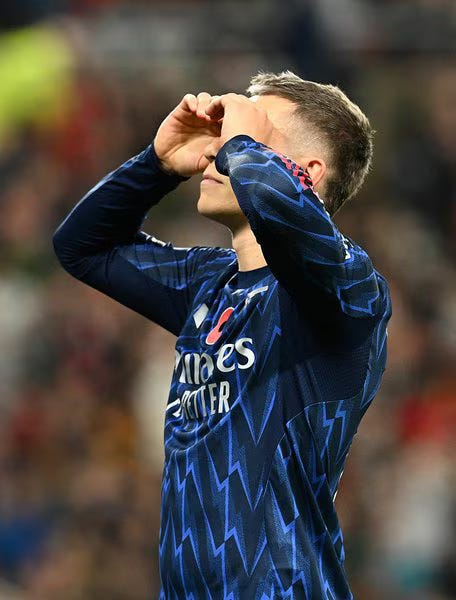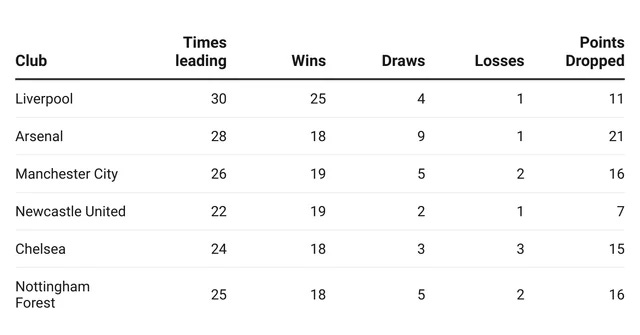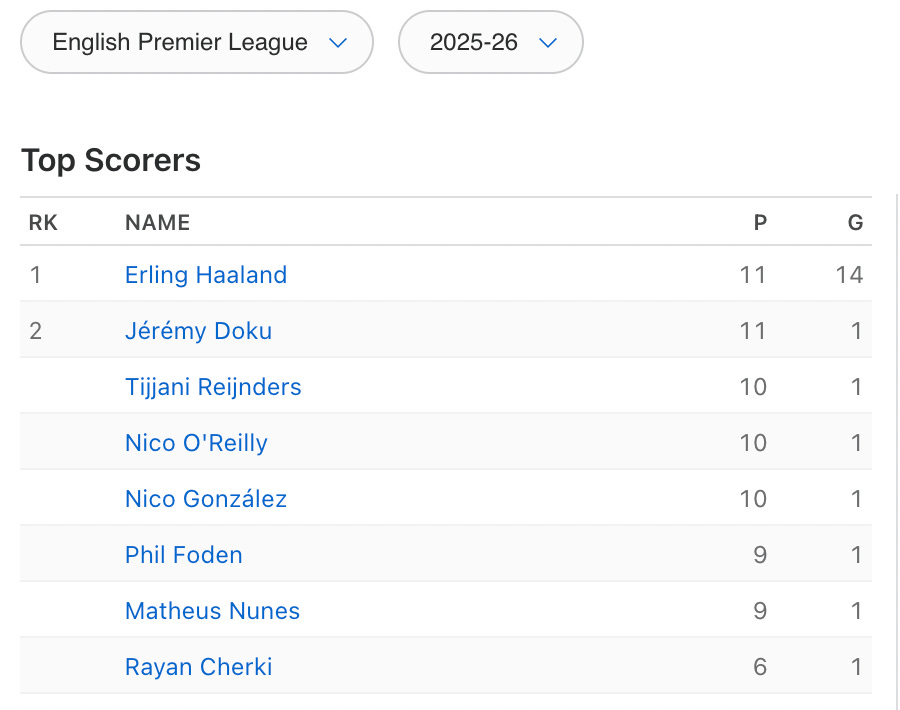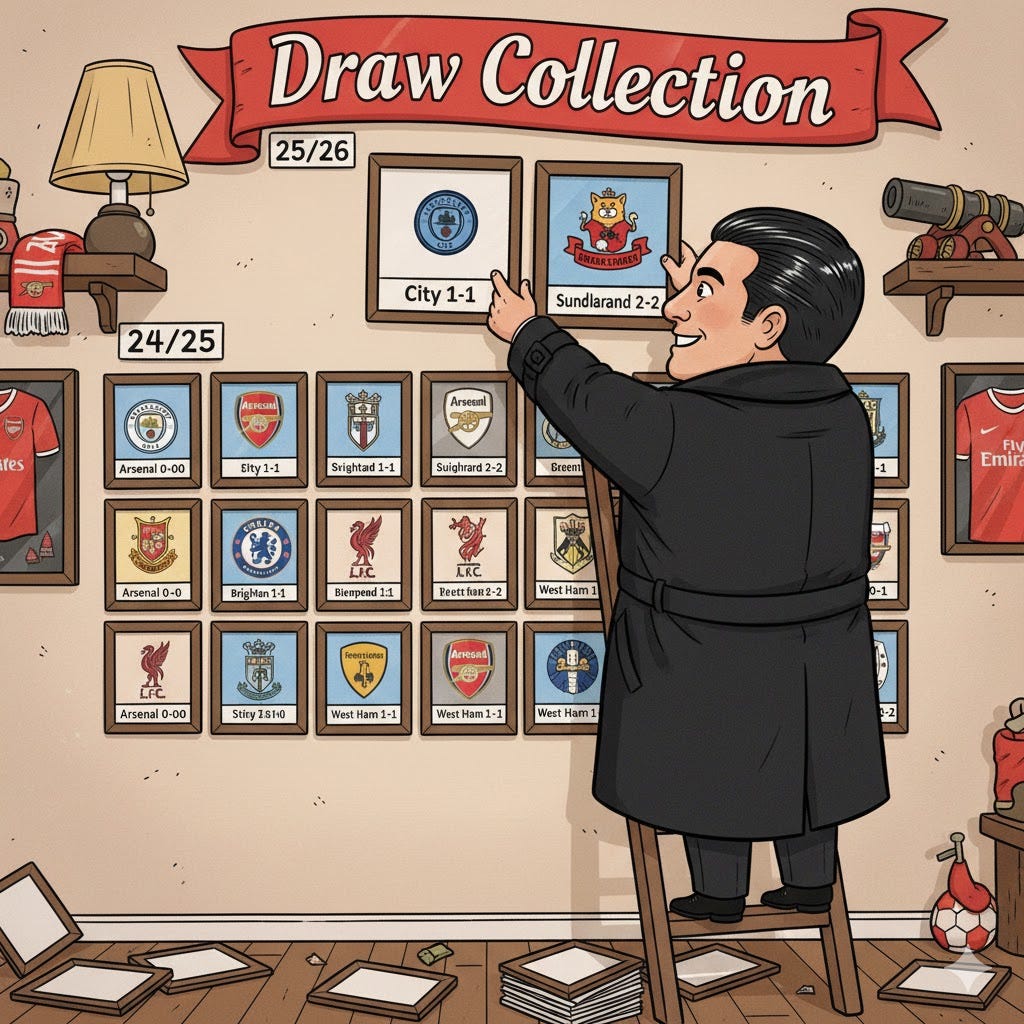Sunderland - on the bus. Shadows of previous season
Arsenal's impressive winning streak has been halted by a highly motivated and energised Sunderland side.
Clean sheets off the agenda
I never quite fancy it when the pre-match chatter is all about securing a win to open up a decent gap (perhaps even a full eight points!) before the international break. Such a long-term perspective, often neglecting the immediate opponent, frequently leads to a rather unsatisfying result. Unfortunately, the prevailing narrative amongst Arsenal fans steered clear of Sunderland, and my uneasy gut feelings proved, sadly, well-founded.
The first half wasn’t exactly an entertainment – we failed to create clear-cut chances, instead attempting to patiently prod and probe the opposition without much success with one crucial difference from our previous games - Sunderland managed to bag a goal.
They earned a free-kick after Zubimendi was, in my opinion, unfairly cautioned for stopping a counter-attack. Rice made a calculated decision not to contest the ball, allowing it to drift into a less threatening area – a choice with some sound logic behind it. Gabriel, however, misread Rice’s intention, anticipating a challenge and positioning himself to clear any potential rebound, leaving Isidor free. Another perfectly logical decision, in isolation. What wasn’t right was Rice’s failure to immediately track back after letting the ball pass him, allowing an ex-Arsenal academy player to absolutely smash one past Raya. He did it with directness, power, and sheer desire that some of our attackers rarely exhibit.
All things considered, it took a mere two-second miscommunication between Gabriel and Rice to put an end to our clean sheet record, which only serves to highlight how unimportant the entire topic truly is. I’ve mentioned several times that fixating on it might actually hinder the team. Now, with the run behind us, we can finally focus on the simple objective of winning matches and outscoring our opponents.
Who delivered when it mattered most?
The conceded goal meant we were up against the toughest challenge for this Arsenal team: an organised, deep block. These well-drilled Premier League defensive structures are typically incredibly difficult to break down, usually requiring an opponent’s error or a moment of pure brilliance from one of our own.
Bukayo Saka, who looked knackered throughout this game, seized a golden opportunity after Rice expertly dispossessed a Sunderland player with a perfectly executed press. An unexpected strike with his weaker foot, arrowing into the bottom corner – a truly world-class finish. For the remainder of the match, he didn’t look particularly convincing, and I’ll delve into that more shortly, but he undoubtedly delivered when the team desperately needed him.
Following the equaliser, Arsenal, who had started the second half with significantly increased tempo, continued to pepper the Sunderland defence with uncomfortable questions. And who emerged as the day’s second hero? None other than the Belgian Hulk, a player seemingly written off during the summer transfer window. I recently saw a clip of Trossard’s press conference response to Arteta calling him “grumpy,” where he essentially stated that he hates losing any game, be it in training, with friends, or even when playing with his children. That last part is generally a bit disturbing, but it certainly proved invaluable against a tenacious Sunderland side.
Trossard, with a delightful turn and twist that left the Sunderland defender flat-footed – who was busy gesticulating at a teammate to track Calafiori’s run – absolutely smashed a worldie into the near top corner! It’s the Belgian’s third goal of the season, and every one has been a crucial intervention in the game’s pivotal moments.

Our third hero of the day, who truly stepped up in a critical moment, was Martin Zubimendi. Whenever a club snaps up a player from a mid-table side, especially one who’s spent their entire senior career there, questions inevitably arise about their character. Why stay there so long when their talents clearly belong on a grander stage? Do they lack ambition? Do they prefer being the big fish in a small pond rather than competing with the city boys? How will they perform under pressure, when the stakes are at their highest? Will they simply follow the established leaders, or will they be the ones to set the tempo?
And from what I’ve seen of Zubimendi, I’m thoroughly impressed. When we’re trailing, Martin is always the one pushing further up the pitch, getting into those dangerous areas. He was on the end of Trossard’s cheeky pass into the box, he was the one to hit the woodwork with one of his tricky volleys. This isn’t the first time Zubimendi has tried to swing the tough game in our favour, and he’s certainly exceeded my expectations.
Just like last season
Generally, the team looked miles off their usual standard. Most of the starting XI appeared jaded, making simple, rushed decisions that are quite uncharacteristic of them. Take Rice, for instance, hitting the ball from the centre circle instead of trying to finish off a counterattack by driving a combination into the opposition’s box.
Merino also struggled to make an impact. Honestly, I mentioned in the preview Premier League defenders seem to have him figured out, and a fired-up Sunderland side was no different. One Merino simply isn’t enough to cause problems for the opposition; he needs to be complemented or rotated with someone who possesses a bit more pace or dribbling prowess. Merino also looked slow and non-creative when he had two clear chances to thump the ball into the net after a rebound. Both times, he was trying to apply the “right technique” and ended up getting closed down by a reckless defender.
But what truly got my goat was that after we took the lead, Arteta reverted to his old habits from last season:
Sticking with his exhausted starting lineup.
Not trusting his bench, despite having capable deputies ready to come on.
Making his first and only substitution as late as the 87th minute.
By bringing on a fifth defender!
We lost so many points from such advantageous positions last season, and, wouldn’t you know it, on Saturday, it happened again.
Once a team has a narrow lead, there are generally two approaches to see out the game:
Shutting up shop and trying to protect the lead, banking on the low probability of the opposition scoring.
Engaging in an exchange of attacks once the opponent is forced to open up. This often benefits the stronger team, given their superior individual player quality that can use opened up spaces.
Now, I’m not suggesting one strategy is always the right call. For instance, the first option might work wonders against formidable opponents like City, who will surely create good chances if given acres of space. It could also be effective against teams that have all but thrown in the towel – much like what we saw against Crystal Palace.
Against the decent sides, especially those rushed forward by an energised home crowd, it rarely brings results. The team chasing an equaliser finds renewed motivation to go all-in on the attack after seeing a creative player sacrificed for a central defender. They’ll continue pushing even harder, firmly believing in their capabilities. This, precisely, is why we saw so many draws last season, and unfortunately, we’ve added another to the tally today.

We had Hincapie, White, Dowman, Nwaneri, and Lewis-Skelly warming the bench – players who have proven they can deliver against tough opposition. Yet, Arteta opted to shut up shop with his trusted starters. One could argue why youngsters like Dowman shouldn’t have been introduced – perhaps he couldn’t offer sufficient defensive output. However, there’s a strong counter-argument. By refreshing your midfield and attack, even partially, with fresh legs, you present the opposition with the threat of rapid counter-attacks they must account for. You also intensify the pressing and running up and down the pitch, which ultimately tires down their legs and increases the likelihood of an unforced error.
And let’s be honest, it’s not exactly Salah and Trent, or Mahrez and Walker, terrorising Sunderland’s flanks. So, we don’t necessarily need to prioritise defensive output from our wingers. A freshly introduced Dowman, paired with the defensive monster Timber, wouldn’t suddenly compromise our structure. In fact, merely having Dowman on the pitch might have been enough to secure the game with a third goal.
If not the youngsters, then why wasn’t Hincapie brought on the left wing, or White on the right? I’m quite sure both would have caused Sunderland no end of trouble. Why did Arteta wait until the 87th minute for his substitutions? Why not start rotating the squad earlier? How could half the fans see that Saka was absolutely knackered, but Arteta apparently couldn’t? I’m pretty certain Sunderland’s coach would bite your hand off if he had the ability to bring Dowman or Nwaneri off the bench. But Arteta, it seems, reverted to his “safety first, no risk” mode and was immediately punished for it.
The team will drop points here and there, and a draw away against one of the better PL sides isn’t a disaster, but the truly frustrating part is that we did the harder bit on Saturday, only to fail at the easier one. Whenever we’re a goal down, it will always be incredibly tough to turn the game around. The opponents dig in deep, they provide double cover for our most dangerous players, and they break the rhythm of the game (something Sunderland mastered on Saturday, with a little help from the referee). So, when we managed to turn things around and take the lead after two brilliant strikes, we entered the easier phase of defending that lead. That’s where the opponent has to open up, leave gaping spaces, take risks, and we can dictate proceedings – how to behave, how to alter our shape, who to unleash from the bench, which pressure points to exploit.
We failed to execute that simpler task, and that second goal is fully on Arteta’s shoulders. We can analyse the episode a hundred times and point our fingers at Raya all we like. But the reason it was scored is that Sunderland genuinely wanted to get back into the game, their crowd was fully behind the team, and they just kept pushing forward, eventually finding the net somehow. We didn’t give them a convincing reason to doubt their abilities or silence the crowd after the 73rd minute.
I’ve witnessed this unsuccessful Arteta approach countless times last season, and it’s incredibly frustrating to see it happening again. This loss of points was entirely avoidable after we had turned the game around. We could, at the very least, have tried to score a third and put the game to bed. Not necessarily go all-out, but perhaps liven up one of the wings and make it the primary direction for our counter-attacks. Now, after the international break, we face two difficult London derbies, where claiming victories will be inherently harder.
City breathing down our necks
Man City have absolutely battered Liverpool and are now a mere four points behind us. Amongst all the Premier League outfits, they look the most primed to go the distance. You might argue their main vulnerability lies in an over-reliance on Haaland. True enough, but didn’t Liverpool have an over-reliance on Salah last season? The Egyptian delivered week in, week out until the title was all but secured, and the Norwegian is a far more imposing, genetically blessed beast.

And it’s not as if Haaland is surrounded by Fulham or West Ham players. Manchester City boast a high-quality squad around him. Yes, none of them are consistently stable enough to churn out a string of positive results, but perhaps they don’t need to be. Maybe they just need to pop up now and then when Haaland’s having an off day, and that’ll be enough to scoop up the crucial points.
Guardiola has altered City’s approach significantly this season, and it suits Haaland down to the ground. They’re no longer obsessed with possession; they’re quite happy to let the opposition hold onto the ball, but the moment they nick it back, they’ll launch a brutal counter-attack. And boy, the Norwegian has all the tools to gallop into a counter. This tactic brought them victories against Liverpool and Bournemouth, as well as a draw at the Emirates.
It’s the very same trap Slot laid for Liverpool’s opponents last season, and now Pep’s pinched it for his Man City. There won’t be many teams who’ll resist the lure into Man City’s half, only to be hurt later by a blonde, galloping bully. This City team isn’t going anywhere, and we all know by experience we can’t afford to drop many points if we’re to compete with them for the title.


